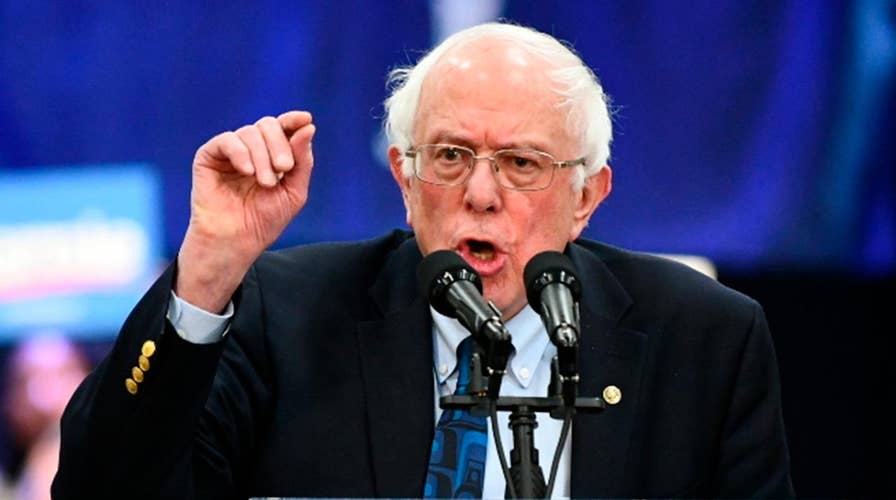Bernie Sanders calls Democratic socialism a 'vibrant democracy'
Sanders defends Democratic socialism; reaction and analysis from Fox News contributor Jessica Tarlov and Wall Street Journal columnist Jason Riley.
Sen. Bernie Sanders hauled in $18.2 million since launching his second straight bid for the Democratic presidential nomination, his campaign announced on Tuesday.
And aides to the independent senator from Vermont touted that they received 900,000 individual contributions in the 41 days from the launch of Sanders’ campaign on Feb. 19 until the end of the first quarter of fundraising on March 31. They said Sanders has “far outpaced” his fundraising from his marathon 2016 race against eventual Democratic nominee Hillary Clinton.
The campaign cash figures make Sanders the fundraising leader so far among the large field of Democrats running for the White House in the 2020 race.
Sen. Kamala Harris of California announced on Monday night that she raised $12 million during the January-March period. And South Bend, Indiana Mayor Pete Buttigieg said he brought in more than $7 million.
No other presidential candidate has yet revealed how much money they’ve raised during the period, which is the first quarter of fundraising since the start of the 2020 White House race.
Fundraising is considered an important barometer of a candidate's popularity and a campaign's strength. The cash can be used by a candidate to build an organization and hire staff and consultants, increase voter outreach efforts, travel and pay to produce and run ads.
SANDERS WARNS AGAINST PACKING SUPREME COURT
While the haul is impressive, the Sanders campaign did fall slightly short of a goal. Their 900,000 individual donations were less than the 1 million milestone they had attempted to reach during the fundraising period. But they highlighted that while it took them 146 days to reach 900,000 contributions in the 2016 campaign, they accomplished the feat in just 41 days this time around.
“I’m sure all the other campaigns would love to be in that posture,” campaign manager Faiz Shakir said.
They also revealed that contributions came from 525,000 individual donors, with one out of five of those donating to Sanders for the first time.
Senior adviser Jeff Weaver said that the Sanders campaign has already begun setting up organizations in the four states that kick off the primary and caucus calendar – Iowa, New Hampshire, Nevada and South Carolina. And he added that in next few weeks, the campaign will be bringing in staff in California, which is the largest of the states to vote right after the early states, on Super Tuesday, which will be held on March 3 of next year.
THE MAD DASH FOR CAMPAIGN CASH
Weaver claimed the fundraising haul will give the Sanders campaign an edge over the competition on Super Tuesday, when Alabama, Massachusetts, Minnesota, North Carolina, Oklahoma, Tennessee, Texas, Utah, Vermont and Virginia join California in voting on the single biggest day of the 2020 nominating calendar.
“These resources are going to allow us to compete on all levels in all of the Super Tuesday states. So while we had to in 2016 make choices in where we could compete – I’m certain that this race, some of our opponents will have to make similar difficult choices – this campaign will have the resources and the volunteer grassroots to compete in every single state in the primary process,” Weaver predicted.
Listing the more than 30,000 donations Sanders’ received in the four early-voting states, and the 167,000 in California, Weaver said, “I think the senator is set up to win in those states.”
SANDERS IN SECOND PLACE IN 2020 PRIMARY NATIONAL POLL
The Sanders campaign said its average donation was $20, and 88 percent of the contributions they received came from people giving $200 or less. They highlighted that the majority of donors are under the age of 39.
The Harris campaign also spotlighted its small-dollar donations, noting that 98 percent of contributions were under $100 and that 99.45 percent of donors could contribute again.
Harris brought in $1.5 million in the first 24 hours of her campaign. That figure was topped in February by Sanders, who raised $5.9 million in his first day as a candidate, and then by former Rep. Beto O’Rourke of Texas, who hauled in $6.1 million in March in the 24 hours after launching his bid. As of Tuesday afternoon, O’Rourke had yet to reveal his first quarter fundraising figures.
The campaigns have until April 15 to file their fundraising reports with the Federal Election Commission.
Buttigieg was the first candidate to reveal his numbers.
THE LATEST FOX NEWS 2020 DEMOCRATIC PRIMARY POLL
Highlighting his grassroots appeal, the Afghanistan War veteran who would become the first openly gay president if he reaches the White House said that his average donation was $36.35.
The fundraising haul is the latest evidence that Buttigieg, who was considered a long shot for the Democratic nomination when he first jumped into the race in January, has become a legitimate contender over the past month, amid a surge in contributions from supporters, growing crowds at his events and rising coverage by the political media.
“You’re going to see bigger numbers from other campaigns today and in the next few days. That’s okay,” Buttigieg told supporters in an email and on social media. “This has always been an underdog project. But with a first fundraising report like this, we certainly cannot be ignored.”














































